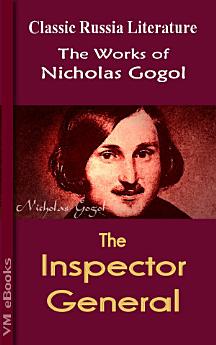The Inspector-General: Russian Literature
Rreth këtij libri elektronik
INTRODUCTION
The Inspector-General is a national institution. To place a purely literary valuation upon it and call it the greatest of Russian comedies would not convey the significance of its position either in Russian literature or in Russian life itself. There is no other single work in the modern literature of any language that carries with it the wealth of associations which the Inspector-General does to the educated Russian. The Germans have their Faust; but Faust is a tragedy with a cosmic philosophic theme. In England it takes nearly all that is implied in the comprehensive name of Shakespeare to give the same sense of bigness that a Russian gets from the mention of the Revizor.
That is not to say that the Russian is so defective in the critical faculty as to balance the combined creative output of the greatest English dramatist against Gogol's one comedy, or even to attribute to it the literary value of any of Shakespeare's better plays. What the Russian's appreciation indicates is the pregnant role that literature plays in the life of intellectual Russia. Here literature is not a luxury, not a diversion. It is bone of the bone, flesh of the flesh, not only of the intelligentsia, but also of a growing number of the common people, intimately woven into their everyday existence, part and parcel of their thoughts, their aspirations, their social, political and economic life. It expresses their collective wrongs and sorrows, their collective hopes and strivings. Not only does it serve to lead the movements of the masses, but it is an integral component element of those movements. In a word, Russian literature is completely bound up with the life of Russian society, and its vitality is but the measure of the spiritual vitality of that society.
Vlerësime dhe komente
Rreth autorit
Nikolai Vasilievich Gogol (1809 – 1852) was a Russian dramatist, novelist and short story writer of Ukrainian ethnicity. Russian and Ukrainian scholars debate whether or not Gogol was of their respective nationalities.
Considered by his contemporaries one of the preeminent figures of the natural school of Russian literary realism, later critics have found in Gogol's work a fundamentally romantic sensibility, with strains of Surrealism and the grotesque ("The Nose", "Viy", "The Overcoat," "Nevsky Prospekt"). His early works, such as Evenings on a Farm Near Dikanka, were influenced by his Ukrainian upbringing, Ukrainian culture and folklore. His later writing satirised political corruption in the Russian Empire (The Government Inspector, Dead Souls), leading to his eventual exile. The novel Taras Bulba (1835) and the play Marriage (1842), along with the short stories "Diary of a Madman", "The Tale of How Ivan Ivanovich Quarreled with Ivan Nikiforovich", "The Portrait" and "The Carriage", round out the tally of his best-known works.










